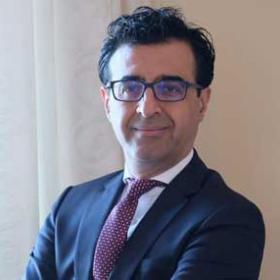
Hassan Analyses Political Context of Corruption in Iraq at RCD Forum 2019
On February 3-5, Kawa Hassan, EWI's Vice President for the Middle East and North Africa program, gave a presentation on the rule of law and governance in Iraq at the Rafidain Center for Dialogue (RCD) Forum 2019, in Baghdad. Other panelists were Hassan Al-Kaabi, First Deputy Speaker of the Iraqi Parliament, Chief Justice Jassim Alumairi, President of Judicial Supervisory Council, Dr. Salah Nuri Alkhalafa, President of Financial Auditing Authority, and Juan Fernando López Aguilar, Member of the European Parliament. The panel was moderated by Bilal Wahab, Fellow, The Washington Institute for Near East Policy.
Click here to watch the panel discussion. Hassan's remarks begin at 18:50-22:45, and again at 57:59-59:49.
A transcription of Hassan's remarks can be found below:
To understand the nature of the corruption in Iraq, we have to go back to the origin of the political system established after the fall of Saddam Hussein in 2003. When we compare corruption in Iraq to similar cases be it in the region or outside middle east, we cannot separate corruption from the type of political system. The Muhasasa system, or sectarian apportionment, set up in 2003 is maybe one of the reasons for the endemic corruption. Muhasasa in and on itself is not a bad thing, it may provide protection for minorities, but it may become entrenched and produce systemic corruption which then might be difficult to eradicate.
Another factor that enhances corruption is the fragmentation between and within parties and communities. This fragmented political system has no central figure or structure but rather has many heads. This systemic fragmentation makes it difficult to pinpoint as who is responsible for corruption. As a result, fragmentation hinders efforts to combat corruption. Whoever would come to power, to become a minister, might feel the temptation to treat the ministry as a party fiefdom—this has been the case since 2003. So far the Iraqi "system" has proved itself to be very resilient, has the capacity to reproduce itself no matter who is in power. Therefore, we first need to understand the nature of the political system and then develop alternative approaches to combat corruption. To be frank, the situation in Basra summarizes the situation in the country. Lack of and discontent about pubic services have led to protests. All political parties and authorities talk about the need for reforms, to fight corruption and provide services, but in the meantime nothing happens and no authority can be hold accountable for lack of services and bad governance.
What could be done to combat corruption in Iraq? When I talked about the systemic nature of corruption, this doesn't mean the system is eternal- no [political] system in the world is eternal. The Iraqi system is very dynamic. There are people within the system that want to reform it. There is also a lot of social energy and activism to change the system. We need to take note of these positive dynamics. The Iraqi society is a resilient society—it showed great resilience against dictatorship and ISIS. The independent institutions need to be truly independent—no one from or close to political parties should head these institutions. I am focusing on independent institutions because at the moment most political parties are in government and there is no real political opposition. Until the Iraqi democracy develops, matures and true opposition emerges, independent institutions and civil society need to be supported to combat corruption.

